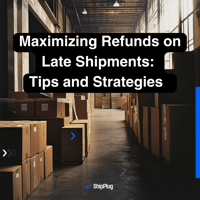In the fast-paced world of shipping, delays are inevitable. Whether due to unforeseen circumstances...
Mastering Parcel Management: Tips for Efficient Tracking, etc.
Parcel management is the backbone of a successful logistics strategy for e-commerce businesses. It doesn't just involve getting an order from point A to point B. It requires choosing the right carriers, ensuring precise labeling, providing real-time tracking updates, and coordinating efficiently with multiple shipping partners. As order volumes increase, the challenges of tracking shipments, managing labeling, and coordinating with carriers become more complex. Without a structured approach, errors and delays can increase, leading to dissatisfied customers and rising costs, so businesses must implement effective tracking systems, automated labeling solutions, and optimized carrier selection to ensure every package reaches its destination quickly and accurately.
In this blog post, we will examine how businesses can implement the right strategies to improve their shipping operations, lower costs, and enhance customer satisfaction.
Choosing the Right Carriers
Selecting the right shipping carrier is a critical decision that directly impacts delivery speed, shipping costs, and overall customer satisfaction. With various carriers offering different service levels, pricing structures, and reliability, businesses must carefully evaluate their options to ensure they align with their shipping needs. Here's what to consider when choosing a carrier:
The Right One is Important
Selecting the right shipping carriers plays a significant role in optimizing parcel management. A well-chosen carrier ensures timely deliveries, reduces shipping costs, and enhances overall reliability. However, not all carriers offer the same level of service, so businesses must carefully evaluate their options.
Evaluating Performance
Assessing carrier performance is a crucial first step. Businesses should examine delivery speed, service reliability, and geographic coverage to ensure the carrier meets their shipping needs. Historical data on delivery success rates can provide valuable insights into which carriers consistently meet deadlines and which ones may cause delays.
Comparing and Optimizing Rates
Comparing shipping rates is another essential aspect of carrier selection. Shipping costs can significantly impact a business's bottom line, especially for e-commerce companies with high order volumes. Multi-carrier parcel management software allows businesses to compare real-time rates and select the most cost-effective options for each shipment.
Specialized Services
Additionally, some carriers provide specialized services such as same-day delivery, international shipping, or handling of fragile items. Businesses should align these services with their product offerings to ensure customers receive the best possible delivery experience.
Streamlining Labeling Processes
Accurate and efficient labeling is a key factor in successful parcel management. A mislabeled package can result in shipping delays, unnecessary costs, and frustrated customers. Businesses should implement the following strategies for smooth and error-free deliveries:
Labeling for Efficient Parcel Management
Optimize labeling to avoid these issues! Efficient and accurate labeling is a fundamental component of parcel management. A mislabeled package can lead to delays, increased costs, and customer dissatisfaction.
Automated Label Generation
Automating label generation enhances accuracy and efficiency. Computerized systems integrated with order management platforms generate labels instantly and correctly, reducing human errors and saving valuable time in fulfillment operations.
Carrier Compliance
Compliance with carrier requirements is another key consideration. Different shipping carriers have specific labeling standards, including barcode placements, shipping class indications, and package weight specifications.
Including Essential Information
Labels should also include all essential information, such as the recipient's address, return address, tracking barcode, and special handling instructions. Clear and complete labeling ensures smooth processing through carrier networks, minimizing the chances of misplaced or delayed shipments.
Enhancing Shipment Tracking
Real-time shipment tracking is no longer a luxury—it's an expectation. Customers want visibility into their orders from when they leave the warehouse until they arrive at their doorstep. Providing accurate, up-to-date tracking information enhances customer satisfaction and reduces the strain on customer service teams by minimizing order status inquiries. Businesses should integrate the following for a seamless delivery experience:
Modernize Tracking
Contemporary tracking technologies go beyond simple location updates. GPS and RFID tracking enable real-time visibility into a package's journey, allowing businesses and customers to monitor delivery progress. By leveraging these technologies, companies can proactively manage delays and communicate accurate delivery expectations to customers.
Branded Tracking
Branded tracking pages offer another way to enhance the customer experience, strengthen brand identity, and create opportunities for cross-selling or personalized promotions. Instead of redirecting customers to a third-party carrier website, businesses can provide a customized tracking page with their branding, messaging, and additional customer engagement features.
Active Notifications
Another key strategy is proactive notifications. Customers appreciate timely updates regarding their shipment status. Automated emails or SMS alerts informing them of expected delivery dates, delays, or successful deliveries enhance transparency and trust. Keeping customers informed at every stage of the delivery process minimizes frustration and reduces the number of inquiries about order status.
Coordinating with Multiple Carriers
Working with multiple shipping carriers gives businesses greater flexibility, cost savings, and improved delivery performance. However, managing various carriers can become complex and inefficient without a structured approach. For companies looking to streamline operations, consider the following:
Simplify Carrier Coordination
Integrating multi-carrier management software simplifies working with different shipping partners. These platforms consolidate carrier options into a single interface, making it easy to compare rates, transit times, and service reliability for each order, enabling businesses to choose the best shipping option to prioritize cost, speed, or special handling requirements.
Contract Negotiation
Another essential strategy is negotiating favorable contracts with carriers. Businesses shipping high volumes can use their data to negotiate better rates and secure discounts. Building long-term relationships with carriers also improves service quality, as companies with strong partnerships may receive priority support and faster issue resolution.
Monitoring Carrier Performance
Monitoring carrier performance is an ongoing necessity. Businesses should regularly assess each carrier's delivery times, reliability, and cost-effectiveness. If a carrier consistently underperforms or becomes more expensive, it may be time to explore alternative options. Continuous evaluation ensures businesses always work with the most reliable and cost-efficient carriers.
Leveraging Technology for Parcel Management
Technology is vital in modern parcel management. It helps businesses improve efficiency, reduce costs, and ensure accurate deliveries. Implementing advanced logistics solutions enables enterprises to streamline shipping operations and scale effectively. Here are some key technologies for parcel management:
Warehouse Management Systems
WMS provides real-time visibility into inventory levels and warehouse activities. A robust WMS automates inventory tracking, order processing, and fulfillment operations, ensuring that shipments are dispatched accurately and on time.
Transportation Management Systems
TMS helps optimize the physical movement of goods. It enables businesses to select the most cost-effective shipping options, plan efficient delivery routes, and track shipments in real-time, improving operational efficiency and reducing transportation costs.
Machine-Assisted Operations
Automation and robotics further enhance parcel management processes. Automated sorting systems, conveyor belts, and robotic pickers reduce manual labor, decrease errors, and increase fulfillment speed. By incorporating these technologies, businesses can handle high order volumes without sacrificing efficiency.
Enhancing Customer Communication
Transparent and proactive communication regarding shipments is crucial for building customer trust and loyalty. Businesses must ensure that customers are well-informed about their orders at every stage of the delivery process. Consider the following for clear communication:
Clear Expectations
Clear shipping policies on the company website help set accurate expectations for delivery times, shipping costs, and return procedures. Customers who know what to expect are less likely to be dissatisfied with their shipping experience.
Multiple-Channel Communication
Offering multiple communication channels further improves the customer experience. Businesses should allow customers to track shipments via email, SMS, or a dedicated customer portal. Providing flexible communication options ensures that customers receive updates in their preferred format.
Post-Delivery Feedback
Another essential practice is collecting post-delivery feedback. After a successful delivery, businesses can request feedback to understand customer satisfaction levels and identify areas for improvement. Positive feedback can be leveraged as testimonials, while negative feedback provides insights into potential shipping challenges to address.
Elevate Your Parcel Management with ShipPlug
Efficient parcel management requires a combination of strategic carrier selection, real-time tracking, technology integration, and proactive customer communication. By optimizing these processes, businesses can streamline shipping operations, reduce costs, and enhance customer experience.
ShipPlug offers a compelling suite of shipping optimization solutions for businesses looking to improve their parcel management. Their platform provides automatic refund recovery, AI-powered invoice auditing, and expert contract negotiations, helping companies reduce shipping costs by up to 50%.
ShipPlug's technology-driven approach allows businesses to maintain existing carrier relationships while benefiting from contract optimizations, late-delivery refunds, and cost-reduction strategies. Companies can save money while improving operational efficiency with no upfront costs and a performance-based pricing model.


